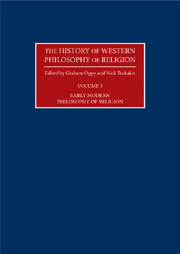Book contents
- Frontmatter
- Contents
- Editorial Introduction
- Contributors
- 1 Early Modern Philosophy of Religion: An Introduction
- 2 Niccolò Machiavelli
- 3 Martin Luther
- 4 John Calvin
- 5 Michel de Montaigne
- 6 Francisco Suárez
- 7 Thomas Hobbes
- 8 René Descartes
- 9 Ralph Cudworth
- 10 Blaise Pascal
- 11 Baruch Spinoza
- 12 John Locke
- 13 Gottfried Wilhelm Leibniz
- 14 George Berkeley
- 15 Voltaire
- 16 The Deists
- 17 Jonathan Edwards
- 18 Thomas Reid
- 19 David Hume
- 20 Denis Diderot
- 21 Immanuel Kant
- 22 Gotthold Ephraim Lessing
- 23 William Paley
- Chronology
- Bibliography
- Index
21 - Immanuel Kant
- Frontmatter
- Contents
- Editorial Introduction
- Contributors
- 1 Early Modern Philosophy of Religion: An Introduction
- 2 Niccolò Machiavelli
- 3 Martin Luther
- 4 John Calvin
- 5 Michel de Montaigne
- 6 Francisco Suárez
- 7 Thomas Hobbes
- 8 René Descartes
- 9 Ralph Cudworth
- 10 Blaise Pascal
- 11 Baruch Spinoza
- 12 John Locke
- 13 Gottfried Wilhelm Leibniz
- 14 George Berkeley
- 15 Voltaire
- 16 The Deists
- 17 Jonathan Edwards
- 18 Thomas Reid
- 19 David Hume
- 20 Denis Diderot
- 21 Immanuel Kant
- 22 Gotthold Ephraim Lessing
- 23 William Paley
- Chronology
- Bibliography
- Index
Summary
The philosophy of Immanuel Kant (1724–1804) covers a wide range of topics, yet questions concerning God and religion were of central importance to his thought throughout his life. His mother was a pietist, and from early on instilled in Kant a sense for the beauty and harmony in nature, in which she encouraged her son to see the traces of God's wisdom. Kant never lost his affinity for this way of looking at the world in general, and for the physico-theological argument for God's existence in particular, although his philosophical convictions imposed serious limitations on what could be known about God.
In one of his earliest publications, a Latin dissertation titled Principiorum primorum cognitionis metaphysicae nova dilucidatio (A new elucidation of the first principles of metaphysical cognition; 1755), Kant attempted to prove God's existence. His argument there proceeds from the concept of possibility and can be summarized as follows. To judge that something is possible is to say that the concepts or representations related in the judgement do not contradict each other but are compatible. This may be called the formal condition of possibility. But there is also a material condition. For in all comparisons, what is to be compared must be given beforehand. If there is nothing to be compared, there can be no comparison and hence no possibility. This means that, for Kant, nothing can be conceived as possible unless whatever is real in every possible representation or concept exists. And, he maintains, it must exist with absolute necessity, because in its absence nothing at all would be possible. Thus possibility itself would be impossible, which cannot be thought without self-contradiction.
- Type
- Chapter
- Information
- The History of Western Philosophy of Religion , pp. 277 - 288Publisher: Acumen PublishingPrint publication year: 2009

